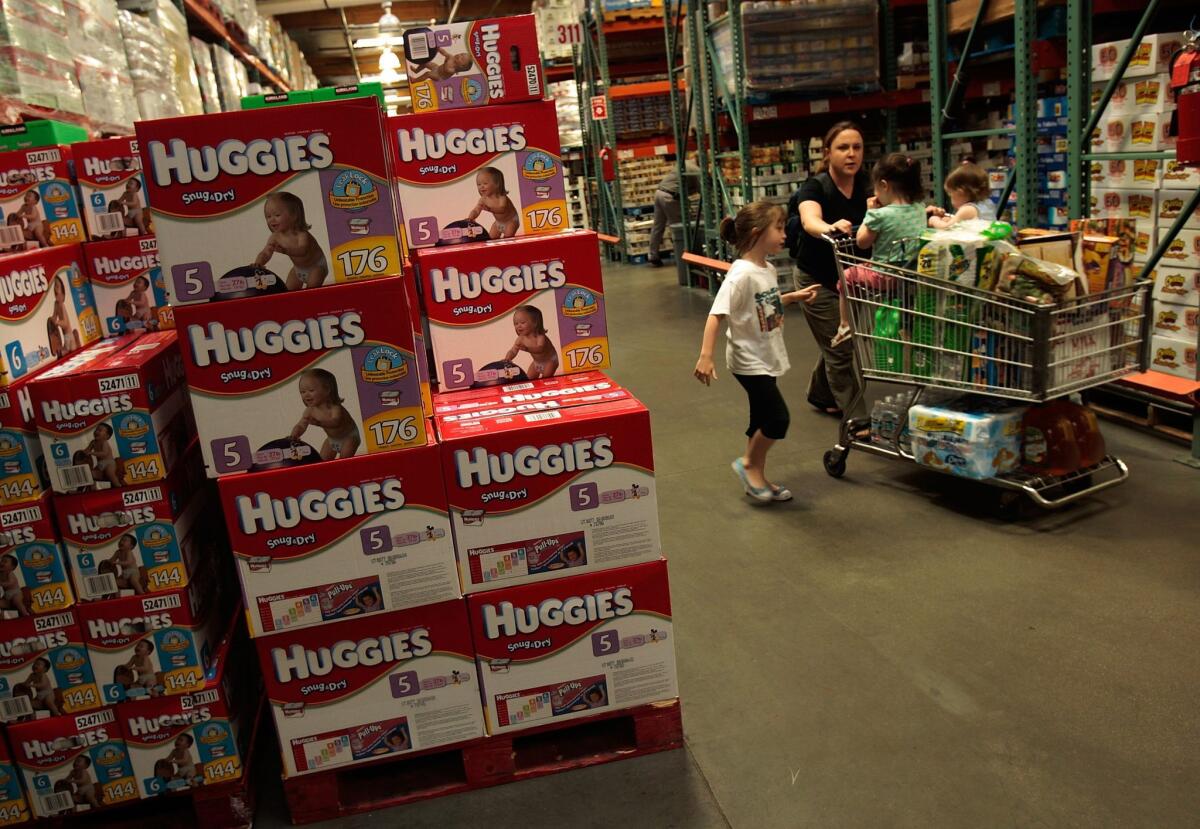Editorial: Keep taxing diapers and tampons

A family passes by bulk packages of diapers at a Costco store in Tucson, Ariz.
- Share via
When it comes to consumer goods, California’s sales tax philosophy is pretty simple: Tax retail purchases except for things that people could die without, such as food, shelter, power, water and prescription drugs and devices. Other states exempt clothing too, considering them essential to human survival. In the temperate Golden State, however, clothing is still optional.
Of course, some nonessentials end up being spared from taxes. Many prescription drugs — think Viagra and Ritalin — are dispensed to improve quality of life, not to maintain it. Girl Scouts don’t have to collect sales taxes on Thin Mints, nor do other nonprofits raising money for charitable causes. And Californians can buy a car from their parents or other close family members without paying sales tax.
But generally it’s straightforward policy and about as fair as a regressive tax can be. Still, a handful of state legislators are pushing sales tax exemptions for things that don’t fall under the life-sustaining mantle. If legislators can’t find the courage to put the brakes on these breaks, the governor must.
It will be hard to say no. All of the proposals support some sympathetic constituency or cause. The bills to exempt diapers and tampons (so-called, though it applies to sanitary pads as well) have gotten the most attention. But there are others, such as a one-year exemption on purchases of gun safes and trigger locks by Assemblywoman Melissa Melendez (R-Lake Elsinore) and a proposal by Assemblyman Mike Gipson (D-Carson) to exempt personal items repurchased from a pawnbroker. There are also two proposed two-day tax holidays, for back-to-school and emergency supplies.
There are compelling arguments for these breaks. Babies need diapers in copious quantities, and tampons are essential to women. Gun safes and trigger locks save lives (in Los Angeles, the latter are required by law), as does having emergency supplies on hand after a disaster. Outfitting kids for the new school year is expensive, especially for poor families. And who doesn’t feel bad for that sorry fellow buying back the power tools he had to pawn?
The authors of the diaper and tampon tax bills — Assemblywomen Lorena Gonzalez (D-San Diego) and Cristina Garcia (D-Bell Gardens), respectively — say they hope to reduce the financial burden on poor women and families. Further, they argue that diapers and feminine hygiene products are necessities and taxing them is unfair.
But the same could be said for many important but taxable products, such as soap, toothpaste, clothes, shoes, toilet paper and deodorant.
If lawmakers want to change how sales tax is applied by redefining it from “necessary to the sustenance of life” to simply “necessary,” then they should do that and apply it evenly — not tinker with the structure item by item. And they must be honest about the real cost of tax cuts to the budgets of state and local governments, which use the revenue to help fund programs and services on which poor women and working families depend, among other things. And while California may have a budget surplus this year, trimming sales taxes would only make the state more reliant on volatile income tax revenues.
Even little tax breaks can have large effects. The state Board of Equalization estimates that if the diaper and tampons bills were to pass, they would cost state and local governments about $56 million a year. And when budget hits are that large, those most likely to pay for it are the people who rely on government programs and aid.
There are better ways to help Californians at the bottom of the economic ladder than carving out tax exemptions that benefit princes as well as paupers. One example is the recently approved state Earned Income Tax Credit, which will put thousands of dollars back into the pockets of low-income working Californians starting this year. Another is targeted subsidies, such as the $50 diaper voucher Gonzalez has proposed for families on welfare who also qualify for child care benefits.
Passing feel-good tax exemptions would probably result in some nice headlines for legislators. But it would come at the expense of a coherent tax structure and, potentially, do more to harm than help the state’s low-income residents.
Follow the Opinion section on Twitter @latimesopinion and Facebook
A cure for the common opinion
Get thought-provoking perspectives with our weekly newsletter.
You may occasionally receive promotional content from the Los Angeles Times.



